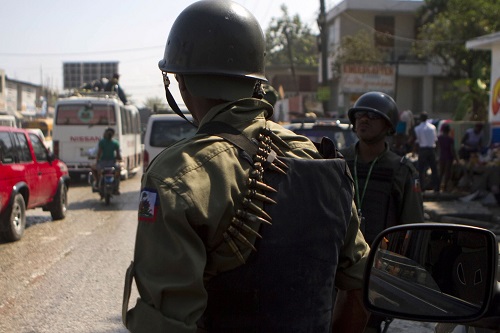AP photo
By
Ricardo Swire
A flashpoint for CARICOM internal security intelligence officials is Haiti’s latest political decision to formally reconstitute the national military. The Defence Minister proclaimed “the Army’s mission would be to fight against contraband smuggling and provide relief in case of natural disasters.” More than 2,200 applications were received after Haiti’s military recruitment first round. A similar concern, about this July 2017 Haiti Defence Ministry’s intention, previously stated in the August 2016 United Nations Secretary-General’s report.
The formal document identified shortcomings in the National Police of Haiti (PNH) and shared Dominican Republic (DR) border control modifications. CARICOM internal security intelligence data spotlighted the financial constraint on Haiti’s coffers that only allows uniforms, equipment and salaries, for less than five hundred soldiers. Historically, Haiti’s powerful drug trafficking networks incorporated rogue military participation. Counter-narcotics operations, conducted against transnational trafficking moving via neighboring DR alone, cost Haiti between US$200 million and US$500 million annually.
Patterns identify Haiti’s corruption in Customs processes and its antiquated fiscal framework as the main catalyst for smuggling across the DR border. Local private security experts question the reintroduction of their country’s military, rather than restructure and improve the 15,000 PNH compliment. For more than twenty years the CARICOM member’s disbanded military was dormant. In the late 1980s the PNH was introduced, Haiti’s 1987 Constitution separating police and military powers. Subtly the Fad’H or Armed Forces of Haiti continued to act as the government’s main law enforcers.
Haitian Armed Forces soldiers functioned as security overseers in rural communities and sectors of the capital Port-au-Prince. In 2004 the UN Peacekeeping Force MINUSTAH was established, the multi-national force popularly considered by Haitians an affront to national sovereignty. 2013 internal security intelligence reports noted a continuation of home invasions in affluent Port-au-Prince communities, a prevalence of illegal guns and drug trafficking violence key concerns. The upsurge in Haiti’s violent crime prompted international response.
During the period America’s Drug Enforcement Administration’s (DEA) “Operations Rum Punch and Rum Chaser” tracked 159 South American drug-planes that landed in Haiti and DR. The PNH’s special Counter Narcotics Unit has 45 US vetted and trained officers. Within the unit the DEA manages a Sensitive Investigative Unit (SIU). These local detectives, in collaboration with MINUSTAH counterparts, collect intelligence and conduct operations against major transnational traffickers.
The UN’s Disarmament, Demobilization and Reintegration (DDR) program, in concert with Haiti’s government Commission for National Disarmament, Demobilization and Reintegration (CNDDR) program, did not yield expected results. According to the PNH’s Director-General in 2015 between two hundred and fifty and two hundred and sixty thousand illegal guns circulated across Haiti. Internal security data indicated the PNH’s MINUSTAH funded US$60,000 firearms incinerator, capable of destroying five hundred guns daily, is under-utilized.
Ricardo Swire
Ricardo Swire is the Principal Consultant at R-L-H Security Consultants & Business Support Services and writes on a number of important issues.



No Comments Yet!
You can be first to comment this post!